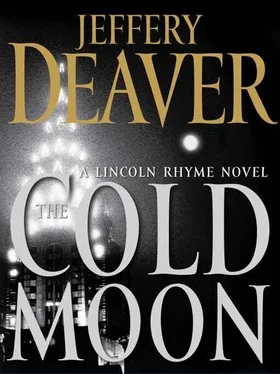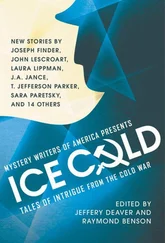"I'm afraid there is. Two days after the trial, Hanson tracked down his wife and daughter in a shopping center parking garage and knifed them to death. The daughter's boyfriend was with them. Hanson killed him too. He fled the area and was finally caught-a year later."
Dance sipped her coffee. "After the murders, the prosecutor was trying to figure out what went wrong at trial. He asked me to look over the transcript of the initial interview at the sheriff's office." She gave a bitter laugh. "When I reviewed it I was floored. Hanson was brilliant-and the sheriff's department deputy who interviewed him was either totally inexperienced or lazy. Hanson played him like a fish. He ended up learning enough about the prosecution's case to completely undermine it-which witnesses to intimidate, what evidence he should dispose of, what kind of alibis he should come up with."
"And I'm assuming he got one other bit of information," Rhyme said, shaking his head.
"Oh, yes. The deputy asked if he'd ever been to Mill Valley. And later he asked if he ever frequented shopping centers in Marin County. That gave Hanson enough information to know where his ex and their daughter sometimes shopped. He basically just camped out around the Mill Valley mall until they showed up. That's where he killed them-and they didn't have any police protection there since it was a different county.
"That night I drove back home along Route One-the Pacific Coast Highway-instead of taking the One Oh One, the big freeway. I was thinking, Here I am being paid a hundred and fifty bucks an hour to anybody who needs a jury consultant. That's all fine, nothing immoral about that-it's the way the system works. But I couldn't help but think that if I'd conducted that interview myself, Hanson would've gone to jail and three people wouldn't have died.
"Two days later I signed up for the academy, and the rest, as they say, is history. Now, what's the scoop with you?"
"How'd I decide to become a cop?" He shrugged. "Nothing quite so dramatic. Boring, actually…just kind of fell into it."
"Really?"
Rhyme laughed.
Dance frowned.
"You don't believe me."
"Sorry, was I studying you? I try not to. My daughter says I look at her like she's a lab rat sometimes."
Rhyme sipped more scotch and said with a coy smile, "So?"
She lifted an eyebrow. "So?"
"I'm a tough nut for a kinesics expert, somebody like me. You can't really read me, can you?"
She laughed. "Oh, I can read you just fine. Body language seeks its own level. You give just as much away with your face and eyes and head as somebody who's got the use of his whole body."
"Really?"
"That's the way it works. It's actually easier-the messages are more concentrated."
"I'm an open book, hm?"
"Nobody's an open book. But some books are easier to read than others."
"I remember you were talking about the response states when you interrogate somebody. Anger, depression, denial, bargaining…After the accident I had plenty of therapy. Didn't want to, but when you're flat on your back, what can you do? The shrinks told me about the stages of grief. They're pretty much the same."
Kathryn Dance knew the stages of grief very well. But, once again, this was not a subject for today. "Fascinating how the mind deals with adversity-whether it's physical trauma or emotional stress."
Rhyme looked off. "I fight with the anger a lot."
Dance kept her deep green eyes on Rhyme and shook her head. "Oh, you're not nearly as angry as you make out you are."
"I'm a crip," he said stridently. "Of course I'm angry."
"And I'm a woman cop. So we both have a right to get pissed off sometimes. And depressed for all sorts of reasons and we deny things. But anger? No, not you. You've moved on. You're in acceptance."
"When I'm not tracking down killers"-a nod at the evidence board-"I'm doing physical therapy. A lot more than I ought to be doing, Thom tells me. Ad nauseam, by the way. That's hardly accepting things."
"That's not what acceptance is. You accept the condition and you fight back. You're not sitting around all day. Oh, sorry, I guess you are."
The sorry was not an apology. Rhyme couldn't help but laugh hard and Dance saw that she scored big points with the joke. She'd assessed that Rhyme was a man with no respect for delicacy and political correctness.
"You accept reality. You're trying to change it but you're not lying to yourself. It's a challenge, it's tough, but it doesn't anger you."
"I think you're wrong."
"Ah, you just blinked twice. Kinesic stress response. You don't believe what you're saying."
"You're a tough woman to argue with." He drained the glass.
"Ah, Lincoln, I've got your baseline down. You can't fool me. But don't worry. Your secret's safe."
The front door opened. Amelia Sachs walked into the room. She tossed off her jacket and the women greeted each other. It was obvious from her posture and her eyes that something was troubling her. She went to the front window and looked out, then pulled the shade down.
"What's the matter?" Rhyme asked.
"I just got a call from a neighbor. She said that somebody was at my building today, asking about me. He gave the name Joey Treffano. I used to work with Joey in Patrol. He wanted to know what I was up to, asked a lot of questions, looked over the building. My neighbor thought it seemed funny and gave me a call."
"And you think somebody was pretending to be Joey? It wasn't him?"
"Positive. He left the force last year and moved to Montana."
"Maybe he came back to visit, wanted to look you up."
"If he did, it was his ghost. He was killed in a motorcycle accident last spring… And both Ron and I've been tailed. And earlier today somebody went through my purse. It was in my car, locked up. They broke in."
"Where?"
"At the scene on Spring Street, near the florist's shop."
It was then that something in the back of Kathryn Dance's mind began to nag. She finally seized the memory. "There's one thing I ought to say… Might be nothing but it's worth mentioning."
The hour was late but Rhyme had called everyone together. Sellitto, Cooper, Pulaski and Baker.
Amelia Sachs was now looking them over.
She said, "We have a problem I want you to know about. Somebody's been tailing me and Ron. And Kathryn just told me that she thought she'd seen someone too."
The kinesics expert nodded.
Sachs then glanced at Pulaski. "You told me you thought you'd seen that Mercedes. Have you seen it again?"
"Nope. Not since this afternoon."
"How about you, Mel? Anything unusual?"
"I don't think so." The slim man pushed his glasses higher on his nose. "But I never pay attention. Lab techs aren't used to being tailed."
Sellitto said he thought he might've seen someone but wasn't sure.
"When you were in Brooklyn today, Dennis," Sachs asked Baker, "you get the feeling that somebody was watching you?"
He paused. "Me? I wasn't in Brooklyn."
She frowned. "But…you weren't?"
Baker shook his head. "No."
Sachs turned to Dance, who'd been studying Baker. The California agent nodded.
Sachs's hand strayed to her Glock and she turned toward Baker. "Dennis, keep your hands where we can see them."
His eyes went wide. "What?"
"We need to have a little talk."
None of the others in the room-who'd been briefed beforehand-gave any reaction, though Pulaski kept his hand near his own piece. Lon Sellitto stepped behind Baker.
"Hey, hey, hey," the man said, frowning and looking over his shoulder at the heavyset detective. "What is this?"
Rhyme said, "We want to ask you a few questions, Dennis."
What Kathryn Dance had felt worth mentioning was something very subtle and it wasn't that somebody'd been following her; Sachs had simply said that to keep Dennis Baker at ease. Dance recalled that earlier, when Baker had mentioned that he'd been at the scene in front of the florist's workshop, she'd observed him crossing his legs, avoiding eye contact and sitting in a position that suggested possible deception. His exact comment at that moment was that he'd just left the scene and couldn't recall if Spring Street had been reopened or not. Since he'd have no reason to lie about where he was, she didn't think anything of it at the time.
Читать дальше












